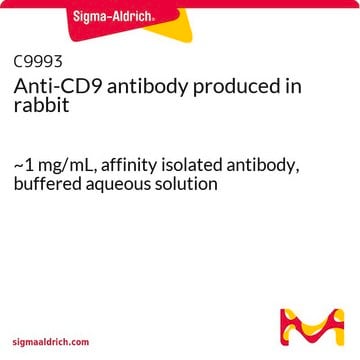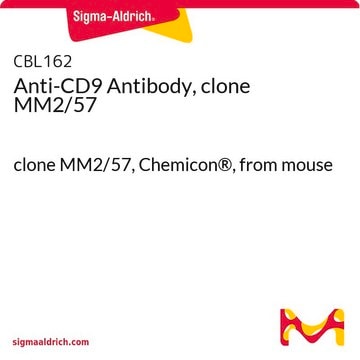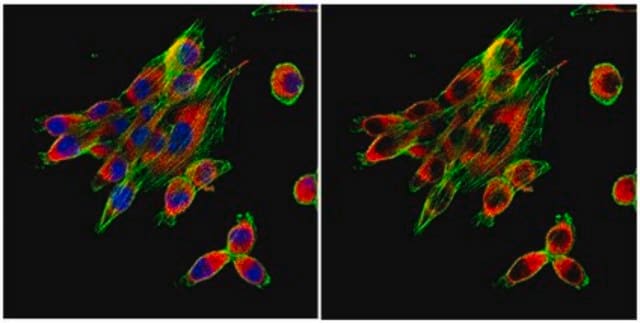추천 제품
생물학적 소스
rabbit
Quality Level
항체 형태
affinity isolated antibody
항체 생산 유형
primary antibodies
클론
polyclonal
정제법
affinity chromatography
종 반응성
human, mouse, rat
기술
immunocytochemistry: suitable
western blot: suitable
NCBI 수납 번호
UniProt 수납 번호
배송 상태
wet ice
유전자 정보
mouse ... Pdcd6Ip(18571)
일반 설명
Programmed cell death 6-interacting protein (UniProt: Q9WU78; also known as ALG-2-interacting protein 1, ALG-2-interacting protein X, E2F1-inducible protein, Eig2) is encoded by the Pdcd6ip (also known as Aip1, Alix) gene (Gene ID: 18571) in murine species. AIP1 is a class E VPS cytoplasmic, ubiquitously expressed protein that is involved in concentration and sorting of cargo proteins of the multi-vesicular body (MVB) for incorporation into intra-lumenal vesicles (ILVs) that are generated by invagination and scission from the limiting membrane of the endosome. AIP1 interacts with ALG-2 (apoptosis-linked gene-2) to regulate cell death. This interaction is strictly dependent on calcium. AIP1 is considered to be essential for the maintenance of fibroblast morphology and has been shown to play a role in the regulation of both apoptosis and cell proliferation. AIP1 is also known to regulate exosome biogenesis in concert with SDC1/4 and SDCBP. AIP1 can undergo phosphorylated on tyrosine residues by activated platelet-derived growth factor receptor-beta (PDGFRB).
특이성
This polyclonal antibody specifically detects AIP1 in Jurkat cells. It is likely to react with isoforms 1, 2, and 3.
면역원
GST-tagged recombinant fragment corresponding to 479 amino acids from the C-terminal half of mouse AIP1/Alix.
애플리케이션
Detect Programmed cell death 6-interacting protein using this rabbit polyclonal Anti-AIP1/Alix, Cat. No. ABC40 that has been tested in Immunocytochemistry and Western blotting.
Immunocytochemistry Analysis: 2.5 µg/mL from a representative lot detected AIP1/Alix in HeLa and NIH3T3 cells.
Research Category
Apoptosis & Cancer
Apoptosis & Cancer
Research Sub Category
Apoptosis - Additional
Apoptosis - Additional
품질
Evaluated by Western Blotting in Jurkat cell lysate.
Western Blotting Analysis: 0.1 µg/mL of this antibody detected AIP1/Alix in 10 µg of Jurkat cell lysate.
Western Blotting Analysis: 0.1 µg/mL of this antibody detected AIP1/Alix in 10 µg of Jurkat cell lysate.
표적 설명
~95 kDa observed; 96.02 kDa calculated. Uncharacterized bands may be observed in some lysate(s).
물리적 형태
Affinity purified
Purified rabbit polyclonal antibody in buffer containing 20 mM Tris-HCl, pH 7.2, 150 mM NaCl with 0.05% sodium azide.
저장 및 안정성
Stable for 1 year at 2-8°C from date of receipt.
분석 메모
Control
HeLa cell lysate
HeLa cell lysate
면책조항
Unless otherwise stated in our catalog or other company documentation accompanying the product(s), our products are intended for research use only and are not to be used for any other purpose, which includes but is not limited to, unauthorized commercial uses, in vitro diagnostic uses, ex vivo or in vivo therapeutic uses or any type of consumption or application to humans or animals.
적합한 제품을 찾을 수 없으신가요?
당사의 제품 선택기 도구.을(를) 시도해 보세요.
Storage Class Code
12 - Non Combustible Liquids
WGK
WGK 2
Flash Point (°F)
Not applicable
Flash Point (°C)
Not applicable
시험 성적서(COA)
제품의 로트/배치 번호를 입력하여 시험 성적서(COA)을 검색하십시오. 로트 및 배치 번호는 제품 라벨에 있는 ‘로트’ 또는 ‘배치’라는 용어 뒤에서 찾을 수 있습니다.
Natalie Lerner et al.
PloS one, 12(2), e0171153-e0171153 (2017-02-28)
Canonical Wnt signaling is associated with glaucoma pathogenesis and intraocular pressure (IOP) regulation. Our goal was to gain insight into the influence of non-pigmented ciliary epithelium (NPCE)-derived exosomes on Wnt signaling by trabecular meshwork (TM) cells. The potential impact of
Hiruni Harischandra et al.
PLoS neglected tropical diseases, 12(4), e0006438-e0006438 (2018-04-17)
The filarial nematode Brugia malayi is an etiological agent of Lymphatic Filariasis. The capability of B. malayi and other parasitic nematodes to modulate host biology is recognized but the mechanisms by which such manipulation occurs are obscure. An emerging paradigm
Min Shi et al.
Acta neuropathologica, 128(5), 639-650 (2014-07-07)
Extracellular α-synuclein is important in the pathogenesis of Parkinson's disease (PD) and also as a potential biomarker when tested in the cerebrospinal fluid (CSF). The performance of blood plasma or serum α-synuclein as a biomarker has been found to be
Hiroko Tadokoro et al.
PloS one, 15(4), e0231430-e0231430 (2020-04-11)
Extracellular vesicles (EVs) in the tumor microenvironment facilitate intercellular communication. Cancer cell-derived EVs act as an immunosuppressor by transporting cargos and presenting transmembrane proteins. By contrast, CD8+ cytotoxic T-lymphocytes (CTLs) exert anti-cancer cytotoxicity via the pore-forming protein perforin. Here, we
Scott W Messenger et al.
The Journal of cell biology, 217(8), 2877-2890 (2018-06-23)
Cancer cells secrete copious amounts of exosomes, and elevated intracellular Ca2+ is critical for tumor progression and metastasis, but the underlying cellular mechanisms are unknown. Munc13-4 is a Ca2+-dependent SNAP receptor- and Rab-binding protein required for Ca2+-dependent membrane fusion. Here
자사의 과학자팀은 생명 과학, 재료 과학, 화학 합성, 크로마토그래피, 분석 및 기타 많은 영역을 포함한 모든 과학 분야에 경험이 있습니다..
고객지원팀으로 연락바랍니다.








